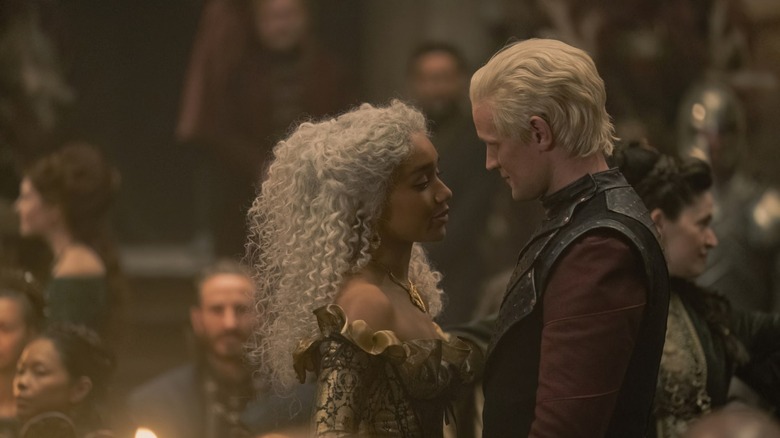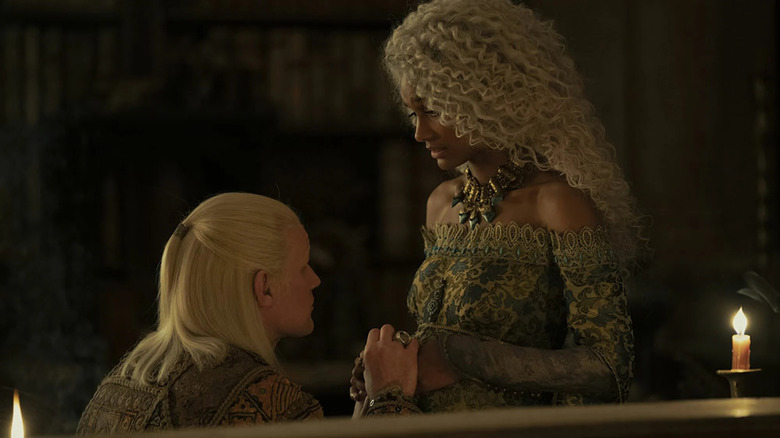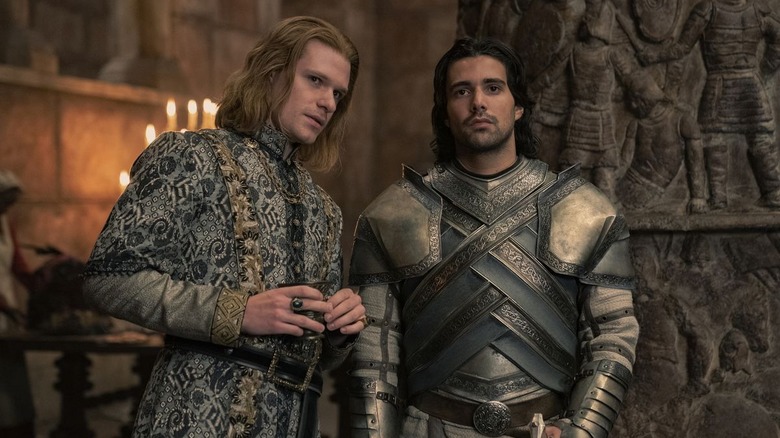Why House Of The Dragon Episode 6 Changed A Character Death From The Book
This post contains spoilers for "House of the Dragon" and its source material, "Fire & Blood."
If there's one thing Daemon Targaryan (Matt Smith) can't do, it's hold down a successful longterm marriage. Not only did his first wife die of an unfortunate horseriding accident — poor Daemon must've been so devastated when he heard the news — but now his second wife, Laena Velaryon (Nanna Blondell), has shuffled off this mortal coil.
Technically, Daemon and Laena's marriage lasted a good 10 years. But the show's time skips led to us only getting a small handful of scenes of the two together, which made it feel as if this period of Daemon's life was just as insignificant to him as his first marriage to Lady Rhea Royce. But despite her limited screen-time, Laena at least goes out on a memorable note. Knowing she's dying from childbirth complications, she chooses to have her dragon Vhagar burn her to death with its dragonfire.
Her death is notable in that, despite "House of the Dragon" being fairly faithful to its source material, Laena's death is changed significantly from her death in the books. There, Laena simply dies from conventional childbirth complications, much like Aemma Targaryan (Sian Brooke) dies in the show's first episode.
It's not the only death change, either: in the show, Laenor's paramour Joffrey is murdered by Criston Cole at the wedding in last week's episode. As the showrunners explained, in the books, "Joffrey is murdered by Criston Cole out of a jealous, wounded rage at a tournament." It's a method of murder that gives Cole far more plausible deniability than the method he goes about in the show.
So, why exactly did the showrunners decide to alter these characters' deaths?
Giving Laena some agency
A major motivation behind Laena's death scene was the showrunners' understanding that the time jump had hurt the character a little. "We didn't get to spend as much time as I think we would have preferred to with Laena," showrunner Ryan Condal explained, "so we wanted to give her a memorable out that felt active and in her character."
And who is Laena as a character? She's a dragon rider. We see she's taken great pride in the fact that she's claimed the biggest dragon in the world, who she's clearly grown attached to. She's also someone who is largely independent and more than willing to speak her mind, even in public situations. Laena is also very much aware of what's happened to pregnant women before her, like Aemma, who died through no choice of her own at the hands of a husband who was focused on getting another heir.
In George R.R. Martin's book "Fire & Blood," the narrator states that Laena attempted to reach her dragon to fly it one last time. The show seems to take the stance that the narrator was wrong about Laena's exact intentions. (The book is told from the perspective of historians who are simply going off recorded accounts at the time.) Maybe she wasn't trying to go for one last ride; maybe she was trying to do what the show version of Laena did, but didn't make it in time. Ultimately, the results are still the same: Laena still dies at a tragically young age. But at least the show lets her go out with the dignity Aemma was never afforded.
Joffrey's unfortunate demise
It feels weird to say this as a "Game of Thrones" fan but man, Joffrey's death was a bummer. He thought he was about to enter a perfect longterm set-up with Laenor, only to get murdered by angry incel Ser Criston Cole. The main change between the show in the books is that this time around, Cole commits his crime publicly. As co-showrunner Condal put it, "We just had him do it out in the open."
The change here makes the situation a lot more frustrating. In "Fire and Blood," Cole kills Joffrey at a tournament where the act can be interpreted as an understandable accident. In the show, there is no benefit of the doubt to be given to Cole, which makes the lack of consequences for his behavior far more frustrating. 10 years have passed and Cole doesn't seem to have suffered any repercussions or have been made to atone for his actions in any way, and Laenor is still having to regularly, politely interact with the man who killed his lover.
But much like with "Game of Thrones," the unfairness here is sort of the point. "It's a brutal world. It's a violent world," Condal said, one where bad people in positions of power get away with these sort of things all the time. Cole, with his ongoing alliance with the increasingly dangerous Alicent (now played by Olivia Cooke), is shaping up to be the sort of love-to-hate character that "Game of Thrones" had in spades. We don't know what this change means for "House of the Dragon" going forward, just that much like the show's predecessor, we know the series won't shy away from the darkest parts of its characters.


